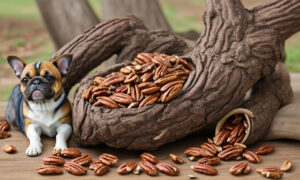Peanut butter is a staple in many households—its creamy texture and rich taste make it a favorite spread on bread and an ingredient in countless recipes. As pet owners, you may often wonder if it’s safe to share this delicious treat with your canine companions. After all, those pleading eyes can be hard to resist! But when it comes to feeding your dog peanut butter, is it a culinary delight or a potential health risk? In this comprehensive article, we’ll explore the question that has crossed the minds of many dog owners: can dogs eat peanut butter?
Peanut butter is more than just a tasty treat; it’s a source of protein, healthy fats, and vitamins. Before you reach for that peanut butter jar, it’s crucial to understand the implications it may have on your dog’s health and well-being. Let’s dive into the truth behind peanut butter for dogs, examining its benefits, risks, and everything in between.
Understanding Peanut Butter: A Dog’s Perspective
Before we indulge in sharing peanut butter with our furry friends, it’s vital to understand what peanut butter is and its constituents. Peanut butter is made from ground peanuts, which are naturally rich in protein, fat, and nutrients like biotin and niacin. However, not all peanut butter is created equal, and understanding the differences is important for your dog’s safety.
The Composition of Peanut Butter
- Protein – Supports muscle development and energy.
- Healthy Fats – Provides essential fatty acids and promotes a healthy coat.
- Vitamins – Niacin, Vitamin E, and other nutrients contribute to overall health.
Safe Peanut Butter for Dogs: What to Look For
When choosing a peanut butter for your dog, opt for raw or natural varieties that are free from additives and sweeteners, such as xylitol—a sugar substitute that is highly toxic to dogs. The ingredients list should be short, typically containing just peanuts and perhaps a bit of salt.
Xylitol: A Toxic Ingredient for Dogs
- Xylitol can cause liver failure and hypoglycemia in dogs.
- It’s imperative to check the labels and ensure peanut butter does not contain xylitol.
Benefits of Peanut Butter for Dogs
Peanut butter isn’t just a tasty snack; it also offers several health benefits for dogs when given in moderation:
Rich in Nutrients
- Vitamin E: An antioxidant that supports the immune system.
- Niacin: Essential for energy metabolism in the body.
Enhancing Training and Medication Administration
- Hide Pills: Peanut butter can effectively conceal medications for dogs who are reluctant to take them.
- Training Aid: Its palatable taste makes it a great reward during training sessions.
The Moderation Rule
- Moderation is key: Peanut butter should be given as an occasional treat, not a dietary staple.
- Monitor Weight: High in calories, peanut butter can contribute to weight gain if not properly managed.
Risks and Precautions When Feeding Peanut Butter to Dogs
Although peanut butter has its perks for pooches, it also comes with potential risks that owners need to navigate carefully.
Allergies in Dogs
- Dogs can develop allergies to peanuts. Observe for signs of allergic reactions like itching, swelling, or digestive upset.
Caloric Content and Obesity
- Peanut butter is calorie-dense. Be mindful of your dog’s daily calorie limit to avoid obesity.
Digestive Issues
- Some dogs might experience gastrointestinal upset. Introduce peanut butter slowly to monitor your dog’s tolerance.
Peanut Butter Alternatives for Dogs
If you’re uncertain about peanut butter or seeking other options, there are several dog-safe alternatives available:
Dog-Safe Nut and Seed Butters
- Almond butter: Ensure it’s free from additives or sweeteners.
- Sunflower seed butter: A good alternative, but also ensure it’s xylitol-free.
Homemade Treats
- Sweet potato: A healthy, fiber-rich treat.
- Pumpkin puree: Great for digestive health and a favorite among canines.
Commercial Dog Treats
- Specifically Formulated for Dogs: These treats are tailored for dogs’ nutritional needs and are a safer option.
Preparing Homemade Peanut Butter for Your Dog
Creating homemade peanut butter ensures that your dog’s treats are free from harmful additives. It’s simple and allows you to control the ingredients.
- Use unsalted, roasted peanuts: Grind them until they reach a creamy consistency.
- Avoid adding sugar or salt: Keep it as natural as possible.
How to Safely Give Peanut Butter to Your Dog
To safely share this treat, follow these guidelines to ensure that your dog enjoys peanut butter without any health risks:
Portion Control
- Small quantities: Limit peanut butter treats to avoid calorie overload.
- Frequency: Keep it occasional, perhaps once a week.
Supervising Your Dog
- Choking hazards: Ensure your dog chews properly and doesn’t gobble up the peanut butter too quickly.
Understanding Your Dog’s Health
- Always consider pre-existing health conditions: Dogs with obesity, diabetes, or pancreatitis should avoid high-fat treats like peanut butter.
Conclusion: Peanut Butter—Friend or Foe for Dogs?
In conclusion, peanut butter can be a safe and enjoyable treat for dogs when given responsibly. However, it’s essential to opt for natural, xylitol-free options and observe your dog for any signs of allergies or adverse reactions. Use peanut butter smartly to enhance your dog’s training experience or make medication administration a breeze. Its nutritional benefits are clear, but always remember the golden rule of moderation to keep your furry friend healthy and happy. Whether you choose store-bought or homemade, your due diligence as a responsible pet owner can make peanut butter a pawsitively nutty and nutritious snack for your canine companion.







